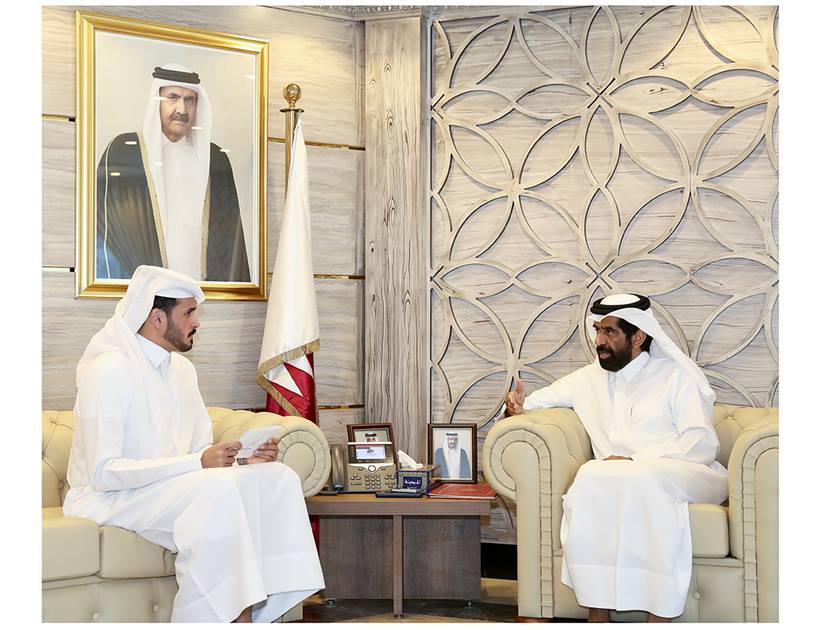Doha, September 11 (QNA) - HE President of Planning and Statistics Authority (PSA) Dr. Saleh bin Mohammed Al Nabit said that the State of Qatar has made a high achievement rate in the Second National Development Strategy, and the Authority has begun preparing the third (2023-2030).
In an interview with Qatar News Agency (QNA), Dr. Al Nabit said that the preliminary results regarding the implementation of Qatar's Second National Development Strategy 2018- 2022, which is scheduled to end in the current year, indicating that many of its goals and desired results have been achieved, although it was exposed to abnormal conditions at the beginning of its launch, most notably the fluctuation of oil prices and the economic repercussions of the Covid-19 pandemic, as it achieved a good percentage of its goals and results.
Regarding implementation of the completion of next strategy, Dr. Al Nabit confirmed that the work teams and executive committees assigned to each sector have begun intensive work in preparing the third national development strategy for the State of Qatar, and great strides have been made in this context.
The major process of preparing this strategy is an extension of the strategic planning in the State of Qatar, and it comes in fulfillment of Qatar National Vision 2030 and its development pillars, under the direct supervision and chairmanship of HE Prime Minister and Minister of Interior Sheikh Khalid bin Khalifa bin Abdulaziz Al-Thani, Chairman of the Supreme Committee for the Preparation of the Third National Development Strategy for the State of Qatar, with the participation of all public and private sectors, HE PSA President said.
Timetables, priorities, foundations and goals were set, and teams were formed in line with the premise on which this strategy was built, HE said. In addition, the starting points for each sector were defined through criteria and indicators on which future goals will be set, and all sectors are working positively to complete the strategy on time, HE added.
Dr. Al Nabit noted that the Third National Development Strategy of the State of Qatar is based on the results of the previous strategies and takes into account the data and achievement rates, whether in terms of the goals they achieved or the challenges they faced, adding that they have ensured that this strategy is based on possible best practices to be objective and actionable, and will achieve the sustainability goals in the State of Qatar.
On the International Monetary Fund raise of its forecast for Qatar's economic growth in 2022 to 3.4 percent, compared to a previous forecast of 3.2 percent, HE the President of the Planning and Statistics Authority explained that these expectations were based on realistic readings that were made by the Fund in coordination with the Authority, especially as the Qatari economy has the strength and durability that enable it to achieve good levels of growth even under unfavorable conditions. HE pointed out that the investment climate in the country is good, stressing on the need to work continuously to improve the investment environment and increase its attractiveness, especially foreign direct investment.
In response to a question about the high rates of inflation in Qatar, HE President of Planning and Statistics Authority (PSA) Dr. Saleh bin Mohammed Al Nabit pointed out that inflation is a global phenomenon that most countries suffer from, but fortunately, the inflation in Qatar is lower than international rates, as annual inflation rate in Qatar edged slightly lower to 4.98 percent in July of 2022, while the euro area annual inflation rate was 8.9 percent in the same month. UK inflation hit 10.1 percent on an annual basis in the same period, and in the United States it reached 8.5 percent in July 2022, he said.
HE noted that inflation exists, but has no significant impacts and is under control, adding that there are many measures to reduce it, and that multiple sectors in the country are working on them to limit its impacts on the population.
Dr. Al Nabit stressed that the Planning and Statistics Authority works with various sectors in the country, including the business sector, to raise the competitive indicators of the Qatari economy, so that the country ranks among the developed countries in these indicators and in a way that reflects its actual performance within the State.
HE underlined that the Authority is dealing with many international bodies and institutions that issue indicators that measure the performance of the State of Qatar in various sectors, such as the International Institute for Management Development (IMD) in Switzerland, for which the Authority is a local partner, and it issues the World Competitiveness Yearbook, whose data depends on statistical indicators on the one hand, and the opinions of stakeholders, the business sector and other sectoral indicators on the other hand. The indicators that monitor the economic movement in the country are also an assistance tool for monitoring the performance of the various economic sectors in the country.
Regarding the new publications of the Planning and Statistics Authority, he said that there is a continuous development and updating of new publications and in dealing with various authorities, referring in this regard to two new publications, which are the "Statistical Communication Strategy", which is concerned with establishing a joint working mechanism between the PSA as the state body designated with providing official statistics in the State of Qatar on one side, and all other parties concerned with statistics in Qatar and abroad on the other side, in addition to the "policy of publishing official statistics in the form of a document that includes the determinants, controls and basic concepts for publishing official statistics through various means of publication, which ensures in an appropriate manner that the needs of all segments of users are met
These documents set a specific framework for dealing with data and other parties, and specific plans and timelines as well as written, agreed and explained steps, highlighting the role of PSA in holding workshops to familiarize other parties with these steps and to ensure that these determinants continue to be used, he said.
He also stressed that the Authority works closely with other concerned authorities specialized in preparing data inside and outside the country to obtain the best practice in dealing with data in terms of collection, analysis, preservation and dissemination, including big data, which is very important and depends heavily on the cooperation of other authorities.
In this context, he indicated that the Authority will organize in September a regional workshop on the changing role of official statistics in the State of Qatar, in which local, regional and international institutions, experts and statistical agencies will participate. Its agenda will include the strategy for preparing data and how to deal with it, he added.
HE the President of the Planning and Statistics Authority called on researchers and specialists in all fields to benefit from the various publications issued by the Authority, especially as they constitute a true reflection of the reality of the Qatari society and economy, and are available periodically and updated on its website.
HE said that the Authority has launched many interactive statistical and digital tools that facilitate the researcher's task, such as the State of Qatar's Foreign Trade Portal, as well as interactive data for Qatar Census 2020, adding that the PSA also highlights the most important information contained in its various publications through its official accounts and on Social Media platforms. (QNA)




